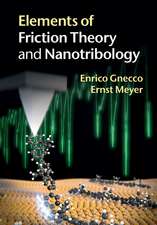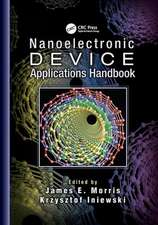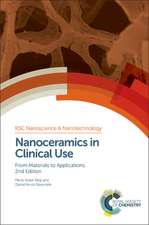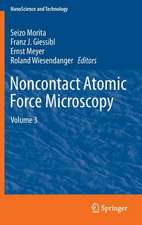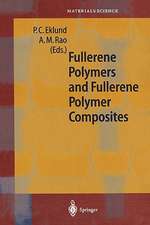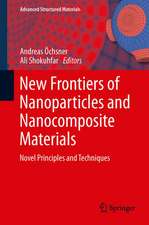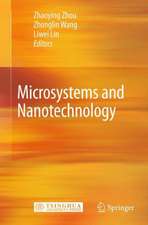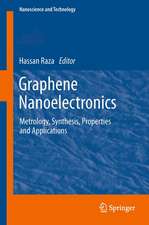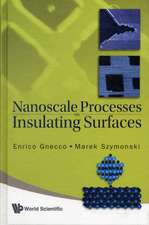Fundamentals of Friction and Wear on the Nanoscale: NanoScience and Technology
Editat de Enrico Gnecco, Ernst Meyeren Limba Engleză Hardback – 24 sep 2024
The updated third edition includes new topics such as molecular tribology, multiscale structural lubricity, tribofilm growth, nanoscale friction in liquids, and nanotribology at insect-plant interfaces. Written by a highly qualified group of international experts, this book aims to be a key reference on the subject for the next five to ten years, highlighting the importance of understanding the atomistic origins of friction and wear in everyday life and in technical applications.
| Toate formatele și edițiile | Preț | Express |
|---|---|---|
| Paperback (1) | 1400.50 lei 6-8 săpt. | |
| Springer International Publishing – 23 aug 2016 | 1400.50 lei 6-8 săpt. | |
| Hardback (2) | 1119.47 lei 3-5 săpt. | |
| Springer International Publishing – 24 sep 2024 | 1119.47 lei 3-5 săpt. | |
| Springer International Publishing – 14 noi 2014 | 1233.17 lei 38-44 zile |
Din seria NanoScience and Technology
- 24%
 Preț: 905.79 lei
Preț: 905.79 lei - 18%
 Preț: 1123.35 lei
Preț: 1123.35 lei - 18%
 Preț: 964.71 lei
Preț: 964.71 lei - 18%
 Preț: 1121.76 lei
Preț: 1121.76 lei - 15%
 Preț: 655.60 lei
Preț: 655.60 lei - 18%
 Preț: 1390.11 lei
Preț: 1390.11 lei - 18%
 Preț: 954.31 lei
Preț: 954.31 lei - 15%
 Preț: 645.79 lei
Preț: 645.79 lei - 18%
 Preț: 953.03 lei
Preț: 953.03 lei - 18%
 Preț: 945.79 lei
Preț: 945.79 lei - 15%
 Preț: 639.90 lei
Preț: 639.90 lei - 18%
 Preț: 1109.16 lei
Preț: 1109.16 lei - 23%
 Preț: 779.87 lei
Preț: 779.87 lei - 18%
 Preț: 944.99 lei
Preț: 944.99 lei - 18%
 Preț: 957.62 lei
Preț: 957.62 lei - 18%
 Preț: 971.01 lei
Preț: 971.01 lei - 18%
 Preț: 1232.26 lei
Preț: 1232.26 lei - 18%
 Preț: 960.30 lei
Preț: 960.30 lei - 15%
 Preț: 646.62 lei
Preț: 646.62 lei - 18%
 Preț: 1249.31 lei
Preț: 1249.31 lei - 15%
 Preț: 636.80 lei
Preț: 636.80 lei - 18%
 Preț: 1232.26 lei
Preț: 1232.26 lei - 24%
 Preț: 821.43 lei
Preț: 821.43 lei - 18%
 Preț: 948.92 lei
Preț: 948.92 lei - 24%
 Preț: 1827.89 lei
Preț: 1827.89 lei - 18%
 Preț: 951.91 lei
Preț: 951.91 lei - 24%
 Preț: 794.21 lei
Preț: 794.21 lei - 18%
 Preț: 953.03 lei
Preț: 953.03 lei - 23%
 Preț: 782.55 lei
Preț: 782.55 lei - 18%
 Preț: 952.57 lei
Preț: 952.57 lei - 18%
 Preț: 948.16 lei
Preț: 948.16 lei - 18%
 Preț: 954.93 lei
Preț: 954.93 lei - 24%
 Preț: 809.40 lei
Preț: 809.40 lei - 23%
 Preț: 781.25 lei
Preț: 781.25 lei - 18%
 Preț: 954.93 lei
Preț: 954.93 lei - 18%
 Preț: 1830.34 lei
Preț: 1830.34 lei - 15%
 Preț: 641.71 lei
Preț: 641.71 lei - 18%
 Preț: 1228.96 lei
Preț: 1228.96 lei - 18%
 Preț: 1120.37 lei
Preț: 1120.37 lei - 18%
 Preț: 956.81 lei
Preț: 956.81 lei - 15%
 Preț: 592.59 lei
Preț: 592.59 lei - 18%
 Preț: 953.65 lei
Preț: 953.65 lei - 18%
 Preț: 954.62 lei
Preț: 954.62 lei - 18%
 Preț: 955.25 lei
Preț: 955.25 lei - 18%
 Preț: 959.19 lei
Preț: 959.19 lei - 18%
 Preț: 953.35 lei
Preț: 953.35 lei - 18%
 Preț: 786.84 lei
Preț: 786.84 lei
Preț: 1119.47 lei
Preț vechi: 1365.20 lei
-18% Nou
Puncte Express: 1679
Preț estimativ în valută:
214.24€ • 222.84$ • 176.87£
214.24€ • 222.84$ • 176.87£
Carte disponibilă
Livrare economică 24 martie-07 aprilie
Preluare comenzi: 021 569.72.76
Specificații
ISBN-13: 9783031630644
ISBN-10: 3031630645
Ilustrații: L, 700 p. 300 illus. in color.
Dimensiuni: 155 x 235 mm
Ediția:Third Edition 2024
Editura: Springer International Publishing
Colecția Springer
Seria NanoScience and Technology
Locul publicării:Cham, Switzerland
ISBN-10: 3031630645
Ilustrații: L, 700 p. 300 illus. in color.
Dimensiuni: 155 x 235 mm
Ediția:Third Edition 2024
Editura: Springer International Publishing
Colecția Springer
Seria NanoScience and Technology
Locul publicării:Cham, Switzerland
Cuprins
Friction Force Microscopy.- Surface Forces Apparatus in Nanotribology.- Ultrasonic Atomic Force Microscopies in Nanotribology.- Atomic-Scale Friction on Crystal Surfaces in Ultra-High Vacuum.- The (Grain) Boundaries of Structural Superlubricity.- Towards Application of Microscale Structural Superlubricity.- Molecular Tribology: Chemically Engineering Energy Dissipation at the Nanoscale.- Nanoisland Manipulation Experiments at Oxidized, Contaminated and Nanorough Interfaces: Structural Superlubricity and Directional Locking.- Tribological Aspects of in Situ Manipulation of Nanostructures Inside Scanning Electron Microscope.- Probing Superlubricity of Layered Van der Waals Contact Junctions by Colloidal Probe Atomic Force Microscopy.- Frictional Characteristics of Graphene on Textured Surfaces.- Early-Stage Wear of Polymer Surfaces and Layered Materials Scraped by a Nanotip.- Nanoscale Study of Antiwear Tribofilm Growth Using in situ Atomic Force Microscopy under Lubricated Contacts.- In Operando Formation of Layered Materials for Friction Reduction.- Dissipation at Large Separations.- Triboluminescence.- Fundamentals of Friction and Wear on the Nanoscale, 3rd Ed., 2023 [Gnecco-Meyer, editors].- Liquid-solid Friction at the Nanoscale: From Hydrodynamics to Molecular Mechanism.- Micro- and Nanotribology at the Insect-plant Interface.
Notă biografică
Enrico Gnecco received his Ph.D. from the University of Genoa, and served as postdoctoral and senior researcher at the University of Basel and IMDEA Nanoscience in Madrid, and also as professor of mechanics of functional materials at Friedrich Schiller University in Jena before joining the Jagiellonian University as professor of nanomechanics. His research focuses on understanding the physical processes that govern surface phenomena such as friction, wear and adhesion down to the atomic scale. This is made possible by the combination of advanced microscopy techniques such as AFM, SEM and TEM with modelling work performed in collaboration with several groups. This line of research, which is fundamental in nature, has a wide range of applications from solid lubrication to tactile sensors. It can also help understand and mitigate environmental problems such as nucleation and release of nanoparticles from solid surfaces damaged by abrasive or plastic wear.
Ernst Meyer received his Ph.D. at the University of Basel in 1990. The topic of force microscopy on ionic crystals and layered materials was treated in his thesis. After a postdoctoral stay at the IBM Research Center Zurich, he started his present position at the University of Basel. His research is focussed on scanning probe microscopy investigations of physical processes at surfaces. Friction and energy loss mechanisms on the nanometer scale as well as photovoltaics related experiments are topics of interest. Recent highlights are the frictional properties of graphene nanoribbons and the observation of Majorana bound states on Fe wires deposited on a Pb superconductor.
Ernst Meyer received his Ph.D. at the University of Basel in 1990. The topic of force microscopy on ionic crystals and layered materials was treated in his thesis. After a postdoctoral stay at the IBM Research Center Zurich, he started his present position at the University of Basel. His research is focussed on scanning probe microscopy investigations of physical processes at surfaces. Friction and energy loss mechanisms on the nanometer scale as well as photovoltaics related experiments are topics of interest. Recent highlights are the frictional properties of graphene nanoribbons and the observation of Majorana bound states on Fe wires deposited on a Pb superconductor.
Textul de pe ultima copertă
This book offers a comprehensive review on the latest developments in the field of nanotribology. With contributed chapters covering instrumental aspects, theoretical models, and selected experimental results, this book provides a broad overview of the fundamental issues currently being investigated in the field.
The updated third edition includes new topics such as molecular tribology, multiscale structural lubricity, tribofilm growth, nanoscale friction in liquids, and nanotribology at insect-plant interfaces. Written by a highly qualified group of international experts, this book aims to be a key reference on the subject for the next five to ten years, highlighting the importance of understanding the atomistic origins of friction and wear in everyday life and in technical applications.
The updated third edition includes new topics such as molecular tribology, multiscale structural lubricity, tribofilm growth, nanoscale friction in liquids, and nanotribology at insect-plant interfaces. Written by a highly qualified group of international experts, this book aims to be a key reference on the subject for the next five to ten years, highlighting the importance of understanding the atomistic origins of friction and wear in everyday life and in technical applications.
Caracteristici
Features a comprehensive and updated review of the latest developments in nanotribology Contributed chapters from international experts cover instrumental aspects, theoretical models, and experimental results New edition includes topics in nanoscale structural superlubricity and bionanotribology


